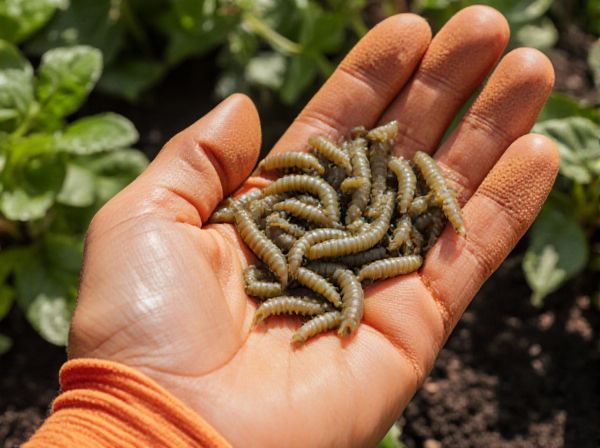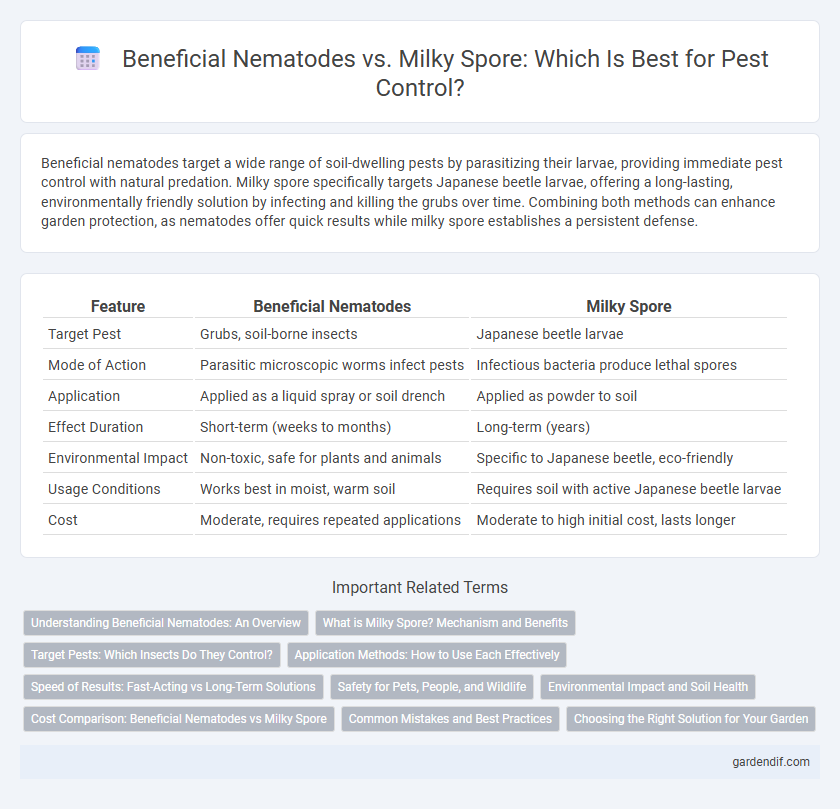
Beneficial nematodes vs Milky spore Illustration
Beneficial nematodes target a wide range of soil-dwelling pests by parasitizing their larvae, providing immediate pest control with natural predation. Milky spore specifically targets Japanese beetle larvae, offering a long-lasting, environmentally friendly solution by infecting and killing the grubs over time. Combining both methods can enhance garden protection, as nematodes offer quick results while milky spore establishes a persistent defense.
Table of Comparison
| Feature | Beneficial Nematodes | Milky Spore |
|---|---|---|
| Target Pest | Grubs, soil-borne insects | Japanese beetle larvae |
| Mode of Action | Parasitic microscopic worms infect pests | Infectious bacteria produce lethal spores |
| Application | Applied as a liquid spray or soil drench | Applied as powder to soil |
| Effect Duration | Short-term (weeks to months) | Long-term (years) |
| Environmental Impact | Non-toxic, safe for plants and animals | Specific to Japanese beetle, eco-friendly |
| Usage Conditions | Works best in moist, warm soil | Requires soil with active Japanese beetle larvae |
| Cost | Moderate, requires repeated applications | Moderate to high initial cost, lasts longer |
Understanding Beneficial Nematodes: An Overview
Beneficial nematodes are microscopic, soil-dwelling roundworms that specifically target and eliminate grubs and other soil-dwelling insect larvae, providing an eco-friendly pest control solution. These nematodes enter their hosts through natural body openings and release bacteria that quickly kill the pest, making them efficient and safe for lawns and gardens. Unlike milky spore, which targets Japanese beetle larvae exclusively and requires specific soil conditions, beneficial nematodes have a broader pest range and can be applied in various soil types and climates for effective pest management.
What is Milky Spore? Mechanism and Benefits
Milky spore is a natural bacterium, Bacillus popilliae, used as a biological control agent against Japanese beetle larvae in soil. It infects and kills grubs by producing spores that multiply inside the larvae, causing a milky appearance and eventual death, reducing beetle populations over time. The benefits include long-lasting soil treatment, environmental safety, and targeted pest control without harming beneficial insects or plants.
Target Pests: Which Insects Do They Control?
Beneficial nematodes target a wide range of soil-dwelling insect pests, including grubs, larvae of beetles, fungus gnats, and root weevils by invading and killing them internally. Milky spore specifically targets Japanese beetle larvae, infecting them with the Bacillus popilliae bacteria that causes a fatal milky disease, providing long-term control. While beneficial nematodes offer broad-spectrum pest control, milky spore is highly specialized for managing Japanese beetle populations in turfgrass and garden soils.
Application Methods: How to Use Each Effectively
Beneficial nematodes are applied by mixing with water and evenly watering the soil, targeting pest larvae directly in the root zone, whereas milky spore is spread as a dry powder over lawn areas to infect Japanese beetle grubs over time. Nematodes require moist, cool soil conditions for optimal survival and should not be exposed to sunlight, while milky spore thrives best when applied in late summer or early fall for long-lasting control. Proper timing and soil moisture management enhance the efficacy of both biological controls in integrated pest management strategies.
Speed of Results: Fast-Acting vs Long-Term Solutions
Beneficial nematodes deliver fast-acting pest control by actively hunting and killing root grubs within days, making them ideal for immediate infestation reduction. Milky spore provides long-term pest management by gradually infecting and killing Japanese beetle larvae over multiple seasons, establishing a sustainable population decline. The choice hinges on whether quick relief or enduring control aligns better with the pest management goals.
Safety for Pets, People, and Wildlife
Beneficial nematodes offer a safe pest control solution as they specifically target soil-dwelling larvae without harming pets, people, or wildlife, making them ideal for residential use. Milky spore is similarly safe but is limited to controlling Japanese beetle grubs and can take several years to establish effectiveness. Both methods present environmentally friendly options, yet beneficial nematodes provide a broader pest control spectrum with minimal risk to non-target organisms.
Environmental Impact and Soil Health
Beneficial nematodes promote soil health by naturally targeting pests without introducing harmful chemicals, preserving microbial diversity and maintaining ecological balance. Milky spore specifically targets Japanese beetle larvae, offering long-term pest control but may alter soil microbial communities due to spore accumulation. Both methods reduce reliance on synthetic pesticides, yet beneficial nematodes provide a broader ecological advantage by supporting overall soil biodiversity and minimizing environmental disruption.
Cost Comparison: Beneficial Nematodes vs Milky Spore
Beneficial nematodes typically require an initial investment of $10 to $30 per 1 million nematodes, providing rapid pest control but needing reapplication every few weeks for maintenance. Milky spore offers a longer-term solution with costs ranging from $20 to $50 per pound, targeting Japanese beetle grubs and potentially lasting several years with a single application. While beneficial nematodes offer faster results, milky spore becomes more cost-effective over time due to its persistence in soil and reduced need for repeated treatments.
Common Mistakes and Best Practices
Beneficial nematodes often suffer from improper storage and incorrect application timing, reducing their effectiveness against soil pests compared to milky spore, which can persist longer in the soil when applied correctly. Common mistakes with milky spore include uneven distribution and neglecting soil pH levels, which affect the spores' ability to infect Japanese beetle larvae. Best practices involve applying beneficial nematodes in moist soil conditions during early morning or late afternoon and ensuring milky spore is evenly spread in areas with slightly acidic soil for optimal pest control.
Choosing the Right Solution for Your Garden
Beneficial nematodes and milky spore both target grubs but differ in application and effectiveness, with nematodes offering faster results by actively seeking pests and milky spore providing long-term soil infestation control. Beneficial nematodes thrive in moist, warm soil and act on a broad range of pests including Japanese beetle larvae, while milky spore specifically targets Japanese beetle grubs and requires years to establish. Selecting between these depends on garden conditions, pest type, and desired speed of pest reduction to optimize lawn health naturally.
Beneficial nematodes vs Milky spore Infographic

 gardendif.com
gardendif.com